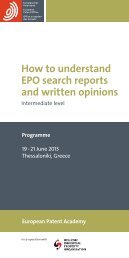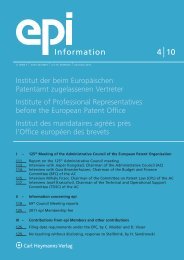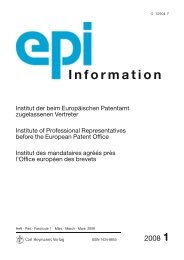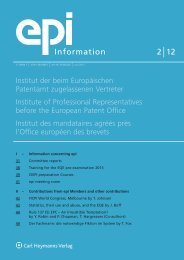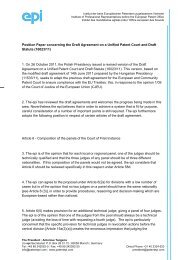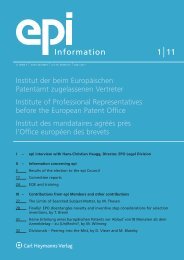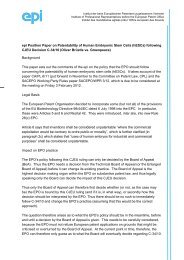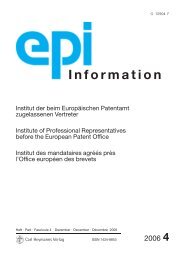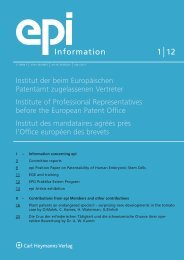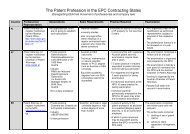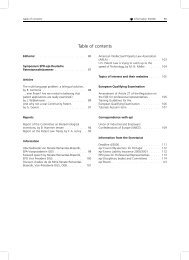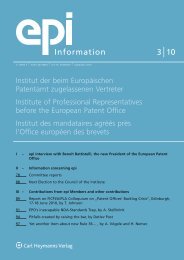epi Information 2/2009
epi Information 2/2009
epi Information 2/2009
You also want an ePaper? Increase the reach of your titles
YUMPU automatically turns print PDFs into web optimized ePapers that Google loves.
<strong>Information</strong> 2/<strong>2009</strong> Council Meeting 41<br />
La seconde présentation faite par M. Koch concernait<br />
la réforme des taxes et le financement durable du<br />
système du brevet européen. Là aussi, le Conseil est<br />
informé qu’un document pour discussion, sur la question<br />
des taxes, est en cours de préparation par le Conseil<br />
d’Administration. Il semble que l’opinion actuelle au sein<br />
du Conseil d’Administration est que les délégations des<br />
Etats Membres sont opposées à une augmentation globale<br />
des taxes mais que la structure des taxes pourrait<br />
être re-examinée. La commission de l’<strong>epi</strong> pour les Finances<br />
de l’OEB va continuer son travail d’observateur en ce<br />
qui concerne cette question.<br />
Les membres du Conseil souhaitent la bienvenue à M.<br />
Dana Marlin, nouveau membre du Conseil et du Bureau.<br />
Le trésorier présente les comptes pour l’exercice 2008<br />
et le budget pour l’année <strong>2009</strong>, ce dernier étant basé sur<br />
l’affiliation de 9.200 membres.<br />
Afin de mieux contrôler les coûts des commissions, les<br />
présidents des commissions de l’<strong>epi</strong> sont invités à réfléchir<br />
sur le nombre des réunions et à optimiser l’efficacité<br />
du travail de leur commission.<br />
Le Directeur de l’<strong>epi</strong> pour „l’Enseignement et la Formation“,<br />
M. Henk Hanneman (NL) fit également une<br />
présentation très informative. Celle-ci fut suivie entre<br />
autres d’une discussion sur l’intérêt de la Formation<br />
Professionnelle Continue. M. Hanneman préparera un<br />
document sur ce sujet, lequel sera présenté au Conseil<br />
lors de sa prochaine réunion.<br />
A la suite de la présentation du rapport de la Commission<br />
de rédaction, le Conseil approuve à une forte<br />
majorité la restructuration du website.<br />
Les rapports des commissions sont publiés dans cette<br />
édition et sur le site web de l’<strong>epi</strong>.<br />
La prochaine réunion du Conseil se tiendra le 10<br />
octobre <strong>2009</strong> à Düsseldorf.<br />
Treasurer’s report<br />
C. Quintelier (BE)<br />
A. 2008 accounts<br />
A.1 Income<br />
A surplus of 9% over the budgeted account was realized<br />
over the 2008 budget. This was due to the increase of<br />
the total number of <strong>epi</strong> members (9 038), a higher return<br />
on assets, a higher income on the budgeted education<br />
income, an increased number of <strong>epi</strong> students and less<br />
subscription write off.<br />
The fact that <strong>epi</strong> students benefit from a 50% reduction<br />
when they enroll for an <strong>epi</strong> seminar was again in<br />
2008 beneficial for attracting more <strong>epi</strong> students. As<br />
seminars (CPE seminars and the CEIPI/<strong>epi</strong> litigation<br />
course) were well attended, there was a 45% more<br />
income over the budgeted amount on education. Those<br />
seminars however caused an overall cost which consequently<br />
was also over budget. On balance the education<br />
post caused a deficit of 1 578E, which is acceptable. At<br />
this stage I would like to thank the <strong>epi</strong> secretariat staff<br />
who did an excellent job not only in the organization of<br />
the seminars, but also in taking care that the participants<br />
did timely pay. The policy not to admit participants, who<br />
did not pay beforehand, really proved this effect.<br />
Due to the fact that, in particular in the second half of<br />
2008, the DWS investment showed a considerable drop<br />
in the interest rate, less interest, than budgeted, were<br />
obtained on this investment. The financial market situation<br />
in 2008 caused a change during the year in the<br />
investment policy and it was opted for short term investments<br />
with fixed rates, of course with guaranteed capital.<br />
In February of <strong>2009</strong> it was even decided to stop with<br />
the DWS investment formula and to invest the money in<br />
short and medium term investment, which provides a<br />
better return on investment. All together it was possible<br />
to obtain an acceptable return on investment despite the<br />
financial crisis.<br />
A.2 Expenses<br />
On the expense side the costs of committees increased<br />
substantially (36%) over the past year and were 26%<br />
above the budgeted amount. Several reasons caused this<br />
increase, so for example the travel costs for EPPC and<br />
Biotech meetings showed a substantial increase, mainly<br />
due to more members participating. The creation of the<br />
litigation committee, the higher number of members<br />
due to the increase of the number of EPC contracting<br />
states, all this caused more travel costs which had to be<br />
reimbursed. Also PQC showed an increase, which finds<br />
its origin i. a. in the REE discussions, the different working<br />
groups (study guide, on-line programs, working visits),<br />
and the nomination of the director of education. In<br />
combination with SACEPO and delegates, the committees<br />
had a cost of 224 910E, which is about 14% of the<br />
total expenses. In comparison the costs for Council,<br />
Board and Presidium meetings were 351 323E, which<br />
is about 22% of the total expenses. The question may<br />
thus be raised if those committee costs are still justified?



